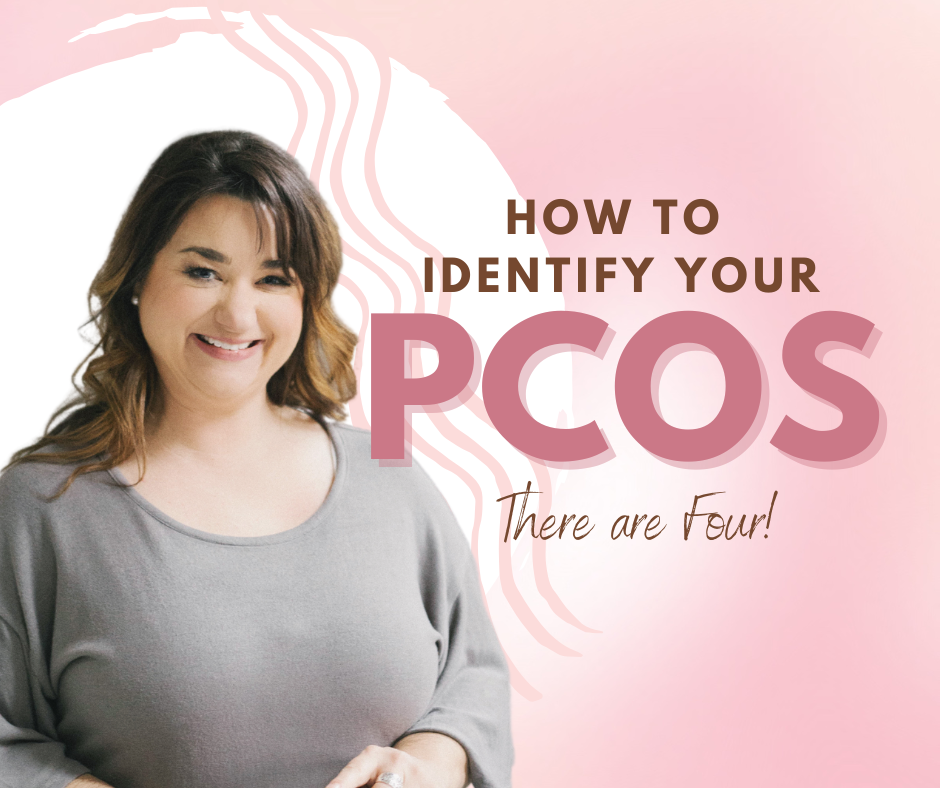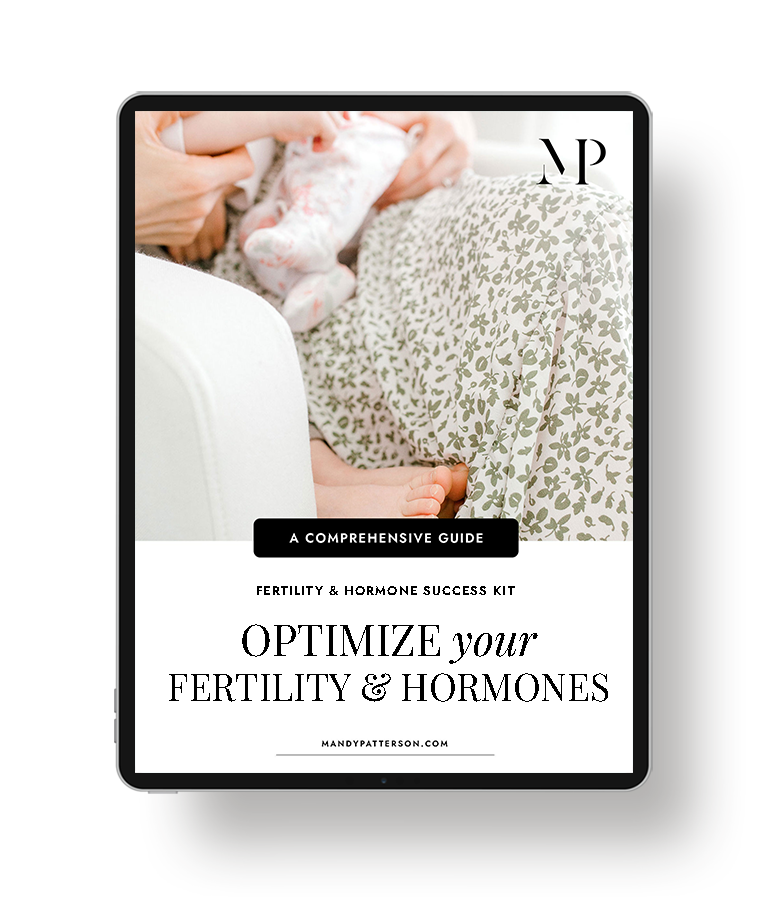Absent periods, abnormally heavy periods, acne, hair loss or hair in unwanted places, infertility, and more are all indications of a pesky problem called Polycystic Ovary Syndrome (PCOS). It is a hormonal disorder based on a collection of symptoms that affects females of reproductive age.
You may be surprised to learn that there are four types of PCOS! Further, every woman experiences PCOS differently based on the type affecting her body.
In this article, you’ll learn about the four types of PCOS and how to identify which type of PCOS you have.
It’s vital that you know which factors are driving your PCOS symptoms so you can begin healing your body. That starts by understanding which type you have.
Keep reading to learn how to identify the four types of PCOS!
What is PCOS?
PCOS is a hormonal imbalance where your body produces too many male hormones like testosterone and DHT. The name for this phenomenon is androgen excess.
PCOS is not a disease; researchers describe it as a diverse disorder with different underlying biological mechanisms.
That means it does not have a specific etiology or cause. Instead, it’s a syndrome that consists of a group of symptoms consistently happening together.
The defining symptoms of PCOS include excess androgens and anovulatory eggs, where the egg is not released in the female menstrual cycle.
To put it simply, it’s more like a description. For example, signs and symptoms are related, but you don’t know what the driving factor is until you determine which type of PCOS you have. PCOS very likely has multiple factors that play into its expression.
For example, genetic and environmental factors have been found to influence the appearance of PCOS in patients.
Interestingly, PCOS is not a condition that causes cysts on your ovaries (more on this below). Polycystic ovaries are a potential symptom but should not be the main reason for diagnosis.
Other symptoms of a general PCOS diagnosis include:
- Missed or irregular periods
- Ovaries that have cysts
- Weight gain, particularly around the abdomen
- Excess body hair
- Male-pattern baldness or thinning
- Acne or oily skin
- Infertility
- Skin tags
- Dark or thick patches of skin on the back of the neck or under armpits or breasts
If you have some of these symptoms and suspect you might have PCOS here is how to get a diagnosis.

PCOS is a hormonal imbalance where your body produces too many male hormones like testosterone and DHT. The name for this phenomenon is androgen excess.
Requirements for a PCOS Diagnosis
This might blow your mind, but the cysts seen in PCOS are not cysts. They are an increased number of follicles, which in some cases can be pretty standard, and are seen in women without PCOS.
If you’re new to women’s health, you might wonder what follicles are. Ovarian follicles are tiny sacs filled with fluid found inside a woman’s ovaries. They secrete hormones that influence stages of the menstrual cycle. Each has the potential to release an egg for fertilization.
The presence of polycystic ovaries has no implication with the endocrine (hormonal) features of PCOS. Basically, you can have polycystic ovaries without excess androgens. Likewise, you can have normal ovaries but wacky hormones. An ultrasound that shows polycystic ovaries cannot be used by itself as a diagnosis for PCOS.
You must have androgen excess to be diagnosed with PCOS. That means you have a high amount of male hormones, such as testosterone and DHT, measurable on a blood test. You also have symptoms that are commonly found alongside PCOS.
If you don’t have androgen excess, you don’t have PCOS, even if you have some of the other symptoms. In that case, you likely have a different hormonal imbalance. A functional medicine practitioner can help you get to the root cause of your hormonal imbalance.
Now, if you have PCOS, here is how you identify which type.
Insulin-Resistant PCOS
Insulin-resistant PCOS is the most common type affecting up to 70% of people with the syndrome. When you have higher insulin levels than normal, you are insulin resistant and have this type of PCOS.
When your cells become numb to insulin’s effects, the pancreas produces more insulin until the cells get the message to uptake blood glucose. This is how insulin resistance happens, it is also known as metabolic syndrome or pre-diabetes.
Unfortunately for women, high insulin levels prevent ovulation. It activates the ovaries to produce testosterone, leading to an excess of male hormones, a.k.a. excess androgens.
Symptoms specific to insulin-resistant PCOS look like the following:
- Struggling with your weight
- Holding weight around the stomach/abdomen
- Struggling with sugar cravings
- Fatigue
- Brain fog
Treatment for insulin-resistant PCOS consists of reversing insulin resistance with diet and exercise. Your functional medicine practitioner will also recommend supplements like magnesium and inositol to lend support.
Post-Pill PCOS
Birth control pills are used to suppress ovulation. When you stop taking the pill, your body may experience what is called post-birth control syndrome.
The result is a whole host of unwanted hormonal imbalances.
What should happen is that your ovaries begin to work again. You should get a monthly period and resume ovulation. However, when you stop taking oral contraceptives, along with post-birth control syndrome, you can experience post-pill PCOS.
Contraceptives such as Ginet, Yasmin, and Yaz are often involved in this type of PCOS due to the type of synthetic progestin used. When coming off these pills, your ovaries experience a temporary surge in androgens.
Women with post-pill PCOS may not recover from the pill’s effects for quite some time and continue to experience suppressed ovulation.
To identify if you have post-pill PCOS, you need to meet three requirements:
- Criteria for general PCOS (excess androgens and anovulation).
- You DO NOT have insulin resistance.
- Symptoms started when you went off the pill.
Treatment for this type of PCOS includes being patient. I know that’s not what you want to hear, but it is a temporary situation that will reverse. Plan to prioritize sleep and stress management.
You should also speak to a functional medicine practitioner about supplements, as oral contraceptives often deplete you of essential nutrients. In fact, working with a functional medicine specialist is a great idea to start optimizing your health post-birth control, especially if you’re looking to get pregnant anytime soon!
PCOS is not a disease; researchers describe it as a diverse disorder with different underlying biological mechanisms.
Inflammatory PCOS
Inflammatory PCOS is a condition in which chronic inflammation causes the ovaries to overproduce testosterone.
Inflammation is a factor in each type of PCOS. The difference is that in inflammatory PCOS, it is the primary factor.
Identify inflammatory PCOS by looking for the following symptoms:
- Headaches
- Joint pain
- Unexplained fatigue
- Skin issues like eczema
- Bowel issues like IBS
In inflammatory PCOS, you often see raised inflammatory markers on a blood test, such as a high CRP (C reactive protein) above 5.
To treat this type of PCOS, start by reducing inflammation. Address food sensitivities, fix any underlying gut problems, and uncover potential histamine intolerance. Treatment should also involve natural anti-inflammatory herbs and supplements. Similarly, a functional medicine practitioner will help you choose the right ones.
RELATED: CAN LOW IRON CAUSE MISCARRIAGE? HOW IRON LEVELS AFFECT FERTILITY
Adrenal PCOS
The fourth type of PCOS is adrenal PCOS. This type of PCOS occurs thanks to abnormal stress response and only affects about 10% of those with PCOS.
DHEA-S, a kind of androgen from the adrenal glands, is elevated in this situation. Meanwhile, the other male hormones, testosterone and androstenedione, are not elevated.
Your adrenal glands are responsible for regulating your body’s stress response. In the case of adrenal PCOS, the adrenal gland, not the ovaries, is stimulated to produce androgens. Another factor in adrenal PCOS may be adrenal fatigue. To get a diagnosis of adrenal PCOS, you will need to test for DHEA-S.
Treatment for Adrenal PCOS begins with managing stress levels, getting enough sleep, and avoiding caffeine. Magnesium, zinc, licorice, and adaptogen herbs will support the treatment of adrenal PCOS. Working with a functional medicine practitioner is a great way to optimize your health and recover from adrenal PCOS.
Need Help Identifying Which Type of PCOS You Have?
At this point, you recognize that PCOS is a complex hormonal disorder with various underlying causes. You can’t reverse it with a prescription. Getting diagnosed with one of the four types of PCOS is vital so you can begin addressing the root cause.
As a Certified Holistic Health and Fertility coach, I’m your go-to girl for healing your hormones and getting your health back on track!
Schedule a free consultation here!
Mandy Patterson

















